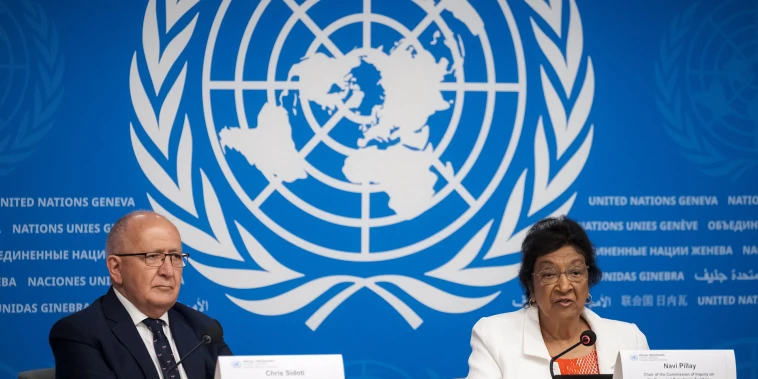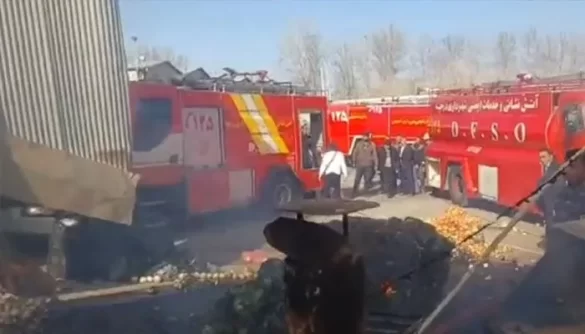Historic UN Finding
For the first time, a United Nations commission has described Israel’s military campaign in Gaza as “genocide.” In a report released in New York, the UN Independent International Commission of Inquiry concluded that Israeli actions since October 2023 showed clear intent to destroy Palestinians in part or in whole.
The report stated that Israel deliberately targeted homes, shelters, and areas designated as safe zones, leaving women, children, and the elderly especially vulnerable. It emphasized that the majority of those killed were civilians, who, according to the commission, were intentionally attacked.
This is the most serious accusation yet against Israel in relation to the ongoing conflict, which has already sparked global debate over international law, accountability, and the responsibilities of states during war.
Key Testimony and Leadership Responsibility
Navi Pillay, the chair of the commission and a former UN High Commissioner for Human Rights, highlighted the role of Israel’s top leadership.
“We examined statements made by Prime Minister Benjamin Netanyahu, President Isaac Herzog, and former Defense Minister Yoav Gallant,” Pillay said. “As official representatives of the state, their words revealed that genocide in Gaza was pursued at a state level.”
The report further alleged that senior Israeli officials not only endorsed the military operations but also actively reinforced them through political and military directives. The commission described this as evidence of state-sponsored intent, a central criterion under the 1948 UN Genocide Convention.
Civilian Toll in Gaza
Since the escalation in October 2023, Gaza has endured some of the most devastating attacks in recent history. According to humanitarian agencies, more than 30,000 Palestinians have been killed, with children making up a significant proportion of the dead. Thousands more remain trapped under rubble or have sustained life-changing injuries.
Entire neighborhoods have been flattened. Infrastructure, including schools, hospitals, and refugee shelters, has been repeatedly struck. The UN report stressed that the pattern of attacks left “no doubt” about systematic targeting, raising alarm among legal experts and human rights organizations.
The commission also noted the dire humanitarian conditions facing Gaza’s 2.3 million residents, with widespread shortages of food, water, and medical supplies. Efforts to deliver aid have even come under attack, as seen when a Gaza-bound aid flotilla was struck by a drone, disrupting humanitarian missions. The situation has been described by aid groups as a “humanitarian catastrophe.”
Israel’s Response
The Israeli government swiftly rejected the UN findings, dismissing the report as “false, biased, and disgraceful.” Officials argued that the commission had adopted a one-sided narrative and failed to acknowledge Israel’s right to self-defense against Hamas attacks.
Israel had already boycotted the inquiry when it began, refusing to cooperate with investigators. Israeli diplomats have repeatedly accused UN bodies of unfairly targeting the country while ignoring Hamas’s role in sparking the conflict through its assault on southern Israel on October 7, 2023. That attack killed around 1,200 people and led to the abduction of more than 200 hostages.
Global Repercussions
The report is likely to intensify international calls for accountability. Several countries, particularly in Europe and Latin America, have faced growing domestic pressure to reassess diplomatic and military ties with Israel. South Africa has already filed a genocide case against Israel at the International Court of Justice (ICJ), proceedings that remain ongoing.
Human rights organizations welcomed the UN commission’s findings, arguing they provide legal weight to ongoing efforts to hold Israel accountable under international law. The use of the term “genocide,” observers say, could significantly shape future debates within the UN General Assembly, the Security Council, and international courts.
However, the path toward accountability remains politically fraught. The United States, Israel’s closest ally, continues to provide diplomatic and military support, making any binding UN action unlikely in the short term.
Growing International Divide
The UN report underscores the widening divide in international responses to the war in Gaza. While many Global South nations and human rights advocates demand stronger legal action, Israel and its allies argue that such reports undermine legitimate defense against armed groups.
As the humanitarian crisis deepens and legal processes unfold, the UN’s recognition of possible genocide marks a turning point. It raises urgent questions about how the world will balance principles of sovereignty, self-defense, and the responsibility to protect civilians in times of war.















